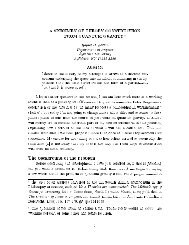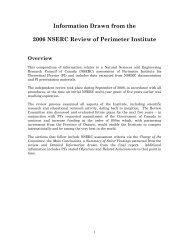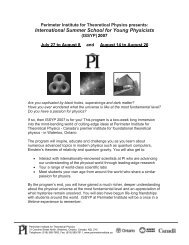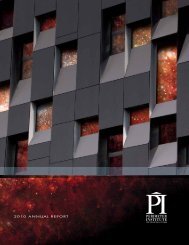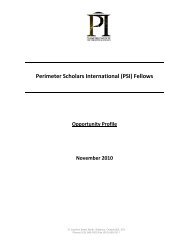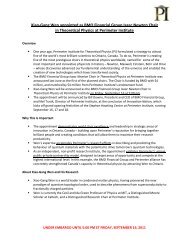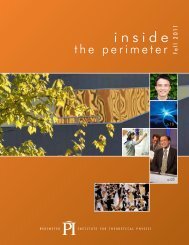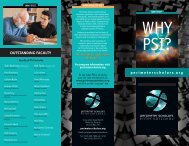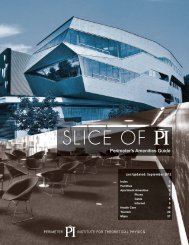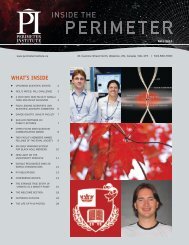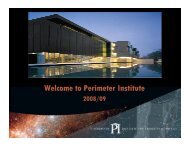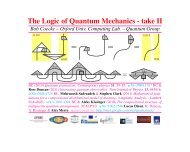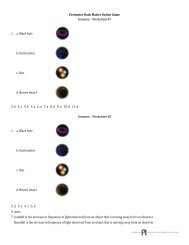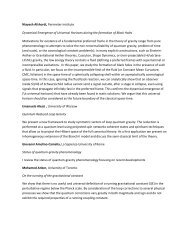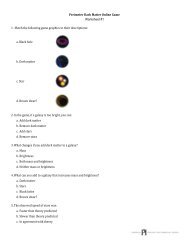(2011-09-29) Postdoctoral Introduction - Perimeter Institute
(2011-09-29) Postdoctoral Introduction - Perimeter Institute
(2011-09-29) Postdoctoral Introduction - Perimeter Institute
Create successful ePaper yourself
Turn your PDF publications into a flip-book with our unique Google optimized e-Paper software.
RESEARCH<br />
OPPORTUNITIES AT PI
PERIMETER INSTITUTE FOR THEORETICAL PHYSICS<br />
Table of Contents<br />
Vision Statement 3<br />
Director 4<br />
Research Programs 5<br />
<strong>Postdoctoral</strong> Opportunities 10<br />
PI Snapshot 11<br />
Scientific Events 12<br />
Facilities 15<br />
Atmosphere 17<br />
Researcher Services 19<br />
About Waterloo and Beyond 22<br />
2
PERIMETER INSTITUTE FOR THEORETICAL PHYSICS<br />
Vision Statement<br />
To create the world’s foremost centre for foundational theoretical physics, uniting public and private<br />
partners, and the world’s best scientific minds, in a shared enterprise to achieve breakthroughs that will<br />
transform our future.<br />
3
Director<br />
Professor Neil Turok<br />
Neil Turok is the Director and a senior Faculty member at <strong>Perimeter</strong> <strong>Institute</strong>. He earned<br />
his PhD at Imperial College, held a postdoctoral fellowship in Santa Barbara, and was an<br />
Associate Scientist at Fermilab before moving to Princeton University, where he became<br />
Professor of Physics in 1994. In 1997, he was appointed to the Chair of Mathematical<br />
Physics in the Department of Applied Mathematics and Theoretical Physics (DAMTP) at the<br />
University of Cambridge. In October 2008, he joined <strong>Perimeter</strong> <strong>Institute</strong> as its Director.<br />
Among his many honours, Professor Turok was awarded Sloan and Packard Fellowships<br />
and the 1992 James Clerk Maxwell medal of the UK <strong>Institute</strong> of Physics.<br />
Professor Turok has worked in a number of areas of theoretical physics and cosmology,<br />
focusing on developing fundamental theories and new observational tests. In the early<br />
1990s, his group showed how the polarization and temperature anisotropies of the cosmic<br />
background radiation would be correlated, a prediction confirmed in detail by recent precision measurements. The<br />
team also developed a key test for the presence of the cosmological constant, also recently confirmed. With<br />
Stephen Hawking, he later developed the Hawking-Turok instanton solutions describing the birth of inflationary<br />
universes.<br />
More recently, with Paul Steinhardt at Princeton, he has developed a cyclic model for cosmology, according to<br />
which the big bang is explained as a collision between two “brane-worlds” in M-theory. In 2006, Steinhardt and<br />
Turok showed how the model naturally allowed the cosmological constant to relax to very small values, consistent<br />
with current observations. Steinhardt and Turok co-authored the popular science book Endless Universe: Beyond<br />
the Big Bang. In 20<strong>09</strong>, Professor Turok was named a Canadian <strong>Institute</strong> for Advanced Research (CIFAR) Fellow in<br />
the cosmology and gravitation program.<br />
Born in South Africa, Professor Turok founded the African <strong>Institute</strong> for Mathematical Sciences (AIMS) in 2003.<br />
Based in Cape Town, this postgraduate educational centre supports the development of mathematics and science<br />
across the African continent (see www.aims.ac.za and www.nexteinstein.org). For this work and his contributions to<br />
theoretical physics, he was awarded the TED Prize (www.ted.com) and a “Most Innovative People” award at the<br />
2008 World Summit on Innovation and Entrepreneurship (WSIE).<br />
4
Research Programs<br />
Cosmology and Particle Physics<br />
Cosmologists at PI combine recent developments at the interface of astrophysics and fundamental physics to shed<br />
light on some of the major puzzles in the field: What is causing the observed cosmic acceleration? What is the<br />
nature of dark matter? What can be learned from microwave background and large scale structure observations<br />
about theories of fundamental physics? Is inflation the correct paradigm of early-universe cosmology?<br />
Particle physicists at PI are also engaged at this interface and seek to identify nature's constituents and interactions<br />
at the most fundamental level, with an emphasis on comparing theoretical ideas with both terrestrial experiments<br />
and astrophysical observations. Researchers are currently involved in identifying how cosmological observations<br />
and terrestrial accelerator and underground experiments constrain the theoretical possibilities for physics beyond<br />
the Standard Model.<br />
Niayesh Afshordi, Associate, Cosmology<br />
PhD Princeton (2004)<br />
Natalia Toro, Faculty, Particle Physics<br />
PhD Harvard (2007)<br />
Latham Boyle, Faculty, Cosmology<br />
PhD Princeton (2006)<br />
Philip Schuster, Faculty, Particle Physics<br />
PhD Harvard (2007)<br />
Neil Turok, Director, Cosmology<br />
PhD Imperial (1983)<br />
Maxim Pospelov, Associate, Particle Physics<br />
PhD Budker <strong>Institute</strong> (1994)<br />
Luis Lehner, Associate, Cosmology<br />
PhD University of Pittsburgh (1998)<br />
Cliff Burgess, Associate, Particle Physics<br />
PhD Texas (1985)<br />
Avery Broderick, Associate, Cosmology<br />
PhD Caltech (2004)<br />
Itay Yavin, Associate, Particle Physics<br />
PhD Harvard (2006)<br />
Sung-Sik Lee, Associate, Particle Physics<br />
PhD Pohang University of Science and<br />
Technology (2000)<br />
For a complete listing of all PI researchers, visit<br />
www.perimeterinstitute.ca/About/People/People_at_PI/<br />
5
Quantum Foundations<br />
The foundations of quantum theory concern the conceptual and mathematical underpinnings<br />
of quantum theory. Research at PI addresses issues such as how quantum theory should be<br />
interpreted, what the deeper principles which underlie the theory are, and how quantum<br />
theory might be modified. This often involves the search for, and analysis of, novel quantum<br />
effects which illustrate the peculiar properties of the theory. Research in the foundations of<br />
quantum theory naturally interfaces with research in quantum information and quantum<br />
gravity.<br />
Lucien Hardy, Faculty<br />
PhD Durham (1992)<br />
Robert Spekkens, Faculty<br />
PhD University of Toronto (2001)<br />
Adrian Kent, Associate<br />
PhD Cambridge (1986)<br />
6
Superstring Theory<br />
String theory is a broad and varied field with strong connections to quantum gravity, particle<br />
physics and cosmology, as well as mathematics. PI’s research group has been working on a<br />
wide range of topics in all three connections. Some of the main research topics are: string<br />
cosmology, the landscape, gauge theory amplitudes, gauge/gravity duality, black rings, and<br />
strings at singularities.<br />
Freddy Cachazo, Faculty<br />
PhD Harvard (2002)<br />
Jaume Gomis, Faculty<br />
PhD Rutgers (1999)<br />
Rob Myers, Faculty<br />
PhD Princeton (1986)<br />
Pedro Vieira, Faculty<br />
PhD École Normale Supérieure Paris and the Centro de<br />
Fisica do Porto, Universidade do Porto (2008)<br />
Alex Buchel, Associate<br />
PhD Cornell (1999)<br />
Davide Gaiotto, Faculty<br />
PhD Princeton (2004)<br />
7
Quantum Gravity<br />
Quantum gravity is concerned with unifying Einstein’s general theory of relativity with quantum<br />
theory into a single theoretical framework. At <strong>Perimeter</strong> <strong>Institute</strong>, researchers are actively pursuing<br />
a number of approaches to this problem including loop quantum gravity, spin foam models, and<br />
causal set theory.<br />
Laurent Freidel, Faculty<br />
PhD Ecole Normale Superieure (1994)<br />
Fotini Markopoulou, Faculty (on leave)<br />
PhD Imperial (1998)<br />
Lee Smolin, Faculty<br />
PhD Harvard (1979)<br />
Thomas Thiemann, Associate<br />
PhD RWTH Aachen (1993)<br />
The main entrance at<br />
<strong>Perimeter</strong> <strong>Institute</strong>.<br />
8
Quantum Information<br />
Quantum mechanics redefines information and its fundamental properties. Researchers at PI seek<br />
to understand the properties of quantum information and study which information processing<br />
tasks are now feasible, and which are infeasible or impossible. This includes research in quantum<br />
cryptography, which studies the trade-off between information extraction and disturbance, and its<br />
applications. It also includes research in quantum error correction, which involves the study of<br />
methods for protecting information against decoherence.<br />
Daniel Gottesman, Faculty<br />
PhD Caltech (1997)<br />
Richard Cleve, Associate (on leave)<br />
PhD Toronto (1989)<br />
Raymond Laflamme, Associate<br />
PhD Cambridge (1988)<br />
Michele Mosca, Associate<br />
PhD University of Oxford (1999)<br />
Ashwin Nayak, Associate<br />
PhD Berkeley (1999)<br />
A footbridge spans across<br />
the courtyard, linking<br />
research offices to additional<br />
collaboration areas.<br />
Guifre Vidal, Faculty<br />
PhD University of Barcelona (1999)<br />
David Cory, Associate<br />
PhD Case Western Reserve University (1987)<br />
9
<strong>Postdoctoral</strong> Opportunities<br />
<strong>Perimeter</strong> <strong>Institute</strong> strives to provide its many postdoctoral researchers with as much research freedom and support<br />
services as possible in order to foster scientific activity. The variety of opportunities, in addition to a highly<br />
competitive remuneration and benefits package, include:<br />
Mentorship by senior Faculty members<br />
Ability to invite visitors and collaborators<br />
Access to generous relocation and ongoing travel funds<br />
Ability to organize and host seminar series, innovative workshops, and conferences<br />
Teaching experience at PI as well as at surrounding universities<br />
Supervision of undergraduate students<br />
Career development support<br />
Administrative assistance with all manner of activity<br />
Full use of all PI programs, facilities and networks<br />
“PI allows for a good combination of complete research freedom and contact with senior<br />
scientists. Having a summer student and participating in various committees was helpful in<br />
finding a Faculty job, since supervision and administration questions inevitably pop up during the<br />
interviews. PI is probably the best place that I've been so far, both in terms of the research<br />
funding and support services, and its visitors and seminar programs.”<br />
Daniel Terno<br />
Former <strong>Postdoctoral</strong> Researcher, Quantum Information<br />
10
PI Snapshot<br />
In just 11 years since the <strong>Institute</strong>’s inception, PI has grown to include:<br />
16 full-time Faculty<br />
15 Associate Faculty<br />
27 Distinguished Research Chairs<br />
47 <strong>Postdoctoral</strong> Researchers<br />
27 Graduate students<br />
37 Masters level students participating in <strong>Perimeter</strong> Scholars International<br />
Research activities have driven:<br />
Over 1650 publications<br />
Over 34,000 citations<br />
Over 1925 visitors<br />
Over 1300 seminars<br />
Over 75 high-level workshops and conferences<br />
11
Scientific Events<br />
<strong>Perimeter</strong> <strong>Institute</strong> has long recognized that a lively program of seminars, high-level workshops, conferences, and<br />
courses is essential to maintaining a dynamic scientific atmosphere and regularly exposing research staff to current<br />
ideas in the wider theoretical physics community.<br />
Seminar Series<br />
All scientists are encouraged to attend, present and invite guest speakers to any of these active series. In addition,<br />
many of the colloquium talks throughout each academic year provide content outside of, but related to, core<br />
disciplines. Regular scheduled talks include:<br />
Series<br />
Time<br />
Quantum Information<br />
Mondays at 4:00 pm<br />
International Loop Quantum Gravity (ILQG)<br />
Tuesdays at 10:00 am<br />
Cosmology & Gravitation<br />
Tuesdays at 11:00 am<br />
Particle Physics<br />
Tuesdays at 12:30 pm<br />
Strings<br />
Tuesdays at 2:00 pm<br />
Quantum Foundations<br />
Tuesdays at 4:00 pm<br />
Colloquium<br />
Wednesdays at 2:00 pm<br />
<strong>Perimeter</strong> <strong>Institute</strong> Quantum Discussions (PIQUDOS)<br />
Alternate Wednesdays at 4:00 pm<br />
Quantum Gravity<br />
Alternate Wednesdays at 4:00 pm<br />
Strong Gravity<br />
Thursdays at 1:00 pm<br />
Condensed Matter<br />
Fridays at 2:30 pm<br />
12
Workshops and Conferences<br />
The <strong>Institute</strong> hosts varied international, scientific gatherings – from small, intimate workshops to<br />
large conferences and summer schools. Past activities have included Cosmological Frontiers in<br />
Fundamental Physics, the Evolving Laws Workshop, and Integrability in Gauge and String Theory<br />
<strong>2011</strong>, among many others. Recent and upcoming activities are listed below. Check our website<br />
regularly for newly scheduled events. You can access past conference content via PIRSA, at<br />
pirsa.org/.<br />
PI-CITA Day <strong>2011</strong>, February 15, <strong>2011</strong><br />
Back to the Bootstrap, April 12-14, <strong>2011</strong><br />
4-Corner Southwest Ontario Condensed Matter Symposium <strong>2011</strong>, April 26, <strong>2011</strong><br />
Conceptual Foundations and Foils for Quantum Information Processing, May 9-13, <strong>2011</strong><br />
Microphysics in Computational Relativistic Astrophysics, June 20-24, <strong>2011</strong><br />
Holographic Cosmology v2.0, June 21-24, <strong>2011</strong><br />
Fundamental Issues in Cosmology, June 20-July 16, <strong>2011</strong><br />
Challenges for Early Universe Cosmology, July 12-16, <strong>2011</strong><br />
Women in Physics Canada, July 19-21, <strong>2011</strong><br />
Integrability in Gauge and String Theory (IGST) <strong>2011</strong>, July 31-August 19, <strong>2011</strong><br />
Unravelling Dark Matter, September 22-24, <strong>2011</strong><br />
Tensor Networks for Quantum Field Theories, October 22-25, <strong>2011</strong><br />
Emergence and Effective Field Theories, October 26-28, <strong>2011</strong><br />
Effective Field Theory and Gravitational Physics, November 28-30, <strong>2011</strong><br />
A presentation in PI’s<br />
205-seat, state-of-the-art<br />
theatre.<br />
“<strong>Perimeter</strong> <strong>Institute</strong> happens to be one of the world’s great hotbeds of quantum<br />
mechanics. They have one of the greatest departments and I try to come here as often<br />
as I can to learn from the folks at PI.”<br />
13<br />
Seth Lloyd, MIT<br />
April 2006
Courses<br />
PI offers a number of courses every year, often in collaboration with surrounding universities.<br />
<strong>Postdoctoral</strong> researchers are offered lecturing and organizing opportunities should they choose to<br />
participate. Past PI <strong>Postdoctoral</strong> Researcher Joseph Emerson, for example, developed the course<br />
“Interpretation of Quantum Mechanics: Current Status and Directions” and invited a number of<br />
visitors including David Wallace and Anton Zeilinger. Examples of other past and present courses<br />
include:<br />
<br />
<br />
<br />
<br />
<br />
<br />
<br />
<br />
<br />
<strong>Introduction</strong> to Quantum Gravity – Lee Smolin, Faculty<br />
<strong>Introduction</strong> to Supersymmetry – Alex Buchel, Associate Faculty<br />
Black Holes & Holography – Leonard Susskind, Distinguished Research Chair<br />
Quantum Error Correction – Daniel Gottesman, Faculty<br />
General Relativity for Cosmology – Achim Kempf, Affiliate<br />
<strong>Introduction</strong> to Effective Field Theory – Cliff Burgess, Associate Faculty<br />
<strong>Introduction</strong> to AdS/CFT Correspondence – Rob Myers, Faculty<br />
Spacetime, Quantum Mechanics and Scattering Amplitudes – Nima Arkani-Hamed,<br />
Distinguished Research Chair, and Freddy Cachazo, Faculty<br />
<strong>Introduction</strong> to Tensor Network Algorithms – Robert Pfeifer, <strong>Postdoctoral</strong> Researcher<br />
Other Interactions<br />
As the country’s focal point in theoretical physics, PI is linked with 30 universities and institutions.<br />
These include locations with PI Associate Faculty members, such as University of Victoria,<br />
McMaster University, University of Western Ontario, and University of Waterloo. An additional<br />
Associate Faculty member, Thomas Thiemann, connects PI to the Max Planck <strong>Institute</strong>.<br />
PI researchers are also involved with the <strong>Institute</strong> for Quantum Computing (IQC), Guelph Waterloo<br />
Physics <strong>Institute</strong> (GWPI), Canadian <strong>Institute</strong> for Theoretical Astrophysics (CITA), Canadian <strong>Institute</strong><br />
for Advanced Research (CIFAR), Fields <strong>Institute</strong>, <strong>Institute</strong> of Particle Physics, Centre de Recherche<br />
Mathematique, and Pacific <strong>Institute</strong> for Mathematical Sciences (PIMS) – to name a few. PI has<br />
recently developed partnerships with Griffith University, University of Queensland, University of<br />
Sydney, and Cambridge University. The <strong>Institute</strong> has also become the first Canadian member in the<br />
LIGO (Laser Interferometer Gravitational Wave Observatory) Scientific Collaboration, partnered with<br />
the Abdus Salam International Centre for Theoretical Physics, and joined forces with seven<br />
institutional partners spanning three continents for the Unification of Fundamental Forces and<br />
Applications (UNIFY).<br />
Mentoring<br />
<strong>Postdoctoral</strong> Researchers at <strong>Perimeter</strong> <strong>Institute</strong> are regarded as independent colleagues who develop<br />
their own research programs. Nonetheless, most postdocs appreciate the opportunity for<br />
advice and mentoring by more experienced colleagues should the need arise. Each <strong>Postdoctoral</strong><br />
Researcher is assigned a member of the Faculty as a mentor who is available to:<br />
<br />
<br />
<br />
<br />
<br />
<br />
Ensure a full orientation and integration into the <strong>Institute</strong><br />
Consult on research plans and monitor progress<br />
Encourage presentations and publications<br />
Procure teaching opportunities, if desired<br />
Maximize research and interaction opportunities<br />
Provide career development advice and support, including assistance in obtaining the next<br />
research position<br />
Opportunities to teach<br />
provide researchers with<br />
valuable experience.<br />
14
Facilities<br />
PERIMETER INSTITUTE FOR THEORETICAL PHYSICS<br />
The award-winning home of <strong>Perimeter</strong> <strong>Institute</strong> is a deliberate marriage of form and function. With the completion<br />
of the Stephen Hawking Centre expansion, the four-level, 120,000 square foot building boasts state-of-the-art IT<br />
infrastructure and provides a combination of private offices, casual interactive areas, and formal presentation<br />
rooms to support all manner of scientific study, collaboration, workshops and conferences.<br />
The design has received enthusiastic support from a wide cross section of the academic community and is highly<br />
regarded by the architectural community – winning a number of design awards including the national Governor<br />
General’s Medal for Architecture in 2006.<br />
Offices<br />
Most research space at the <strong>Institute</strong> provides a peaceful, treetop view of Silver Lake and Waterloo Park, with<br />
windows that open to the fresh air. Offices are equipped with floor-to-ceiling blackboards and fully controllable<br />
lighting. Printers, coffee makers, and other amenities are just steps away.<br />
Collaboration Areas<br />
Comfortable leather couches, cappuccino machines, and blackboards around every corner make the research<br />
lounges scattered throughout the building ideal for discussion, debate and … caffeine! Most of these areas also<br />
feature wood-burning fireplaces.<br />
Seminar Rooms<br />
The <strong>Institute</strong> has five dedicated seminar rooms – named the Alice, Bob, Space, Time, and Gravity rooms – that<br />
can accommodate, in some cases, up to 60 researchers for various collaborative purposes. The Bob Room, for<br />
example, is a large, traditionally-tiered, forward-facing space. The Alice Room, by contrast, is a multi-purpose room<br />
with maximum flexibility to orient chairs and desks in any configuration – depending on workshop or other needs.<br />
Theatre<br />
The 205-seat Mike Lazaridis Theatre of Ideas is the main centre of activity for high-level conferences. It is also<br />
home to many of <strong>Perimeter</strong>’s outreach and cultural activities. The theatre contains a number of features ranging<br />
from the very latest audio/visual technology to window blinds that can be raised to introduce natural light –<br />
depending on the presentation.<br />
To view panoramic photos of <strong>Perimeter</strong> <strong>Institute</strong>, visit<br />
http://www.perimeterinstitute.ca/en/About/Facilities/Virtual_Tour/<br />
15
Library<br />
A variety of books and periodicals can be found in the George Leibbrandt Library, accessible<br />
from the first and second floors. PI scientists can request book purchases via the library<br />
committee and also have full access to the University of Waterloo library system, which<br />
extends to the University of Guelph and Wilfrid Laurier University. Electronic access to<br />
journals is also available.<br />
The Black Hole Bistro<br />
The two-floor bistro is open on weekdays for breakfast in the mornings, lunch from 12:00 to<br />
2:00 pm, afternoon high tea, and a dinner service into the evening. The diverse menu<br />
changes daily. Several nights throughout the week include themed events, such as Musical<br />
Pub Nights. Weekday events include a complimentary tea following the colloquia, and Friday<br />
wine and cheese social. On weekends, a selection of salads and sandwiches are available.<br />
The Bistro is open to PI residents and their guests. Members of the general public are invited<br />
to join researchers and enjoy the fine food and atmosphere in conjunction with ticketed<br />
events — such as jazz concerts and wine tastings.<br />
Health Facilities<br />
Up for a game of squash, racquetball, or shooting hoops? PI’s court is available to you 24<br />
hours a day. The exercise room contains a universal weight system, cross-trainer, treadmill,<br />
stationary bike, and other fitness equipment. Large change rooms are equipped with<br />
saunas. You will also find foosball, billiards, and ping-pong tables located in some areas of<br />
the building.<br />
35 King Street North Building<br />
The original home of <strong>Perimeter</strong> <strong>Institute</strong> is an historic post office building with clock tower. It<br />
is located a short walk from the main facility and offers additional workshop space and<br />
collaboration areas. Used for a change of pace, this century-old building features wooden<br />
floors throughout, a large second floor lounge, and refreshment bar.<br />
PI offers peaceful offices<br />
and spacious collaboration<br />
areas with natural light.<br />
16
Atmosphere<br />
PERIMETER INSTITUTE FOR THEORETICAL PHYSICS<br />
In addition to providing a dynamic and productive multi-disciplinary research atmosphere, <strong>Perimeter</strong> offers a<br />
broad range of opportunities to engage with others throughout the community and beyond via social activities,<br />
outreach initiatives, and cultural events.<br />
Social Activities<br />
Researchers and their families enjoy a variety of organized events. These include day tripping excursions in<br />
the summer months to canoe the Grand River and winter treks to ski and snowshoe at the Blue Mountain<br />
Resort. Other activities include Jam Nights, homecoming BBQ’s, family picnics in the park and holiday dinners<br />
for all researchers and staff members. Extra events, held specifically for children, include special events and<br />
holiday parties. Administrative staff take care of all the details.<br />
Sports activities include pick-up hockey at the nearby Waterloo Memorial Recreation Complex. Several<br />
researchers enjoy running and participating in marathons in Waterloo, Toronto, and Ottawa. The <strong>Institute</strong> also<br />
helps foster participation for interested individuals and small groups in a variety of sporting activities<br />
throughout Waterloo via soccer leagues, tennis clubs, and other organizations.<br />
Spouses and partners of PI scientists have an additional social network to coordinate extra activities – such<br />
as movie nights, lunches, additional day trips via PI’s shuttle van service, shopping excursions, and other<br />
events. Of course, you can always explore Waterloo and beyond on your own.<br />
17
Outreach Initiatives<br />
The <strong>Institute</strong> is committed to providing a full range of year-round educational outreach<br />
opportunities geared toward students, teachers, and members of the general public. The<br />
programming involves yearly science camps and in-school presentations for students, teacher<br />
training workshops, plus monthly forums, lectures and special festivals for members of the<br />
general public. This portfolio of programming specifically includes the:<br />
<br />
<br />
<br />
<br />
<br />
International Summer School For Young Physicists (ISSYP)<br />
Physica Phantastica in-class presentations<br />
EinsteinPlus Teacher’s Workshop<br />
Monthly Public Lecture Series<br />
Multi-week festivals - such as Einsteinfest (2005), the Quantum to Cosmos festival<br />
(20<strong>09</strong>), and the Equinox Summit: Energy 2030 (<strong>2011</strong>)<br />
Many researchers enjoy the opportunity to provide a presentation or lead a mentorship<br />
session. Aside from being fun, outreach participation provides added experience that can be<br />
documented on CVs.<br />
Programs for the general public include a popular monthly lecture series that regularly<br />
attracts over 600 people per event. The focus of talks varies, and often includes<br />
presentations by preeminent scientists who are visiting PI. Past guest speakers have included<br />
Edward Witten, Leonard Susskind, Steven Weinberg, Sir Roger Penrose, Paul Steinhardt,<br />
Frank Wilczek, Seth Lloyd, John Stachel, Anton Zeilinger, Juan Maldacena, and many others.<br />
Physica Phantastica at<br />
the Grand Opening of the<br />
Stephen Hawking Centre<br />
Cultural Activities<br />
Complimenting the twin research and outreach mandates at PI is “Event Horizons” - an integral<br />
mix of concerts by renowned artists, and informal evenings of jazz.<br />
The performances at PI capitalize on the intimacy of the main theatre and provide added<br />
opportunities to meet and mingle with artists in the casual atmosphere of the Black Hole Bistro<br />
following each presentation. Internationally acclaimed past and upcoming performers at PI<br />
include Brian Eno, Emanuel Ax, the Tokyo String Quartet, Lynn Harrell, Gil Shaham, James Galway,<br />
Richard Goode, the Berlin Philharmonic Wind Quartet, Steven Isserlis, the Hagen String<br />
Quartet, Yefim Bronfman, and Yo-Yo Ma, among many others.<br />
PI welcomed Yefim Bronfman<br />
for a performance in <strong>2011</strong>.<br />
“It is inspiring to see that this building is so beautiful and that it welcomes the<br />
public in the way that it does.”<br />
Frank Wilczek<br />
MIT<br />
18
PERIMETER INSTITUTE FOR THEORETICAL PHYSICS<br />
Researcher Services<br />
<strong>Perimeter</strong> <strong>Institute</strong> strives to provide exceptional administrative support to all scientists. PI staff ensure that<br />
researchers have all the information and assistance needed to make their experience at PI as productive and<br />
enjoyable as possible. Assistance is provided in matters such as:<br />
Immigration<br />
Housing<br />
Payroll and Benefits<br />
Travel Arrangements and Reimbursements<br />
Local Transportation<br />
Workshop and Conference Planning<br />
Promotions and Communications<br />
Information Technology and Audio/Visual Requirements<br />
Human Resource needs<br />
19
A Synopsis of Services<br />
Visa and Immigration Assistance<br />
If you are from out of country and require a work permit or other assistance to stay in<br />
Canada, <strong>Perimeter</strong> <strong>Institute</strong>’s Human Resources department will assist you with the process.<br />
This will generally involve contact with the nearest Canadian consulate, high commission or<br />
embassy to obtain and file the necessary forms.<br />
Spouses or partners who wish to work in Canada should also apply at the same time.<br />
Human Resources will be happy to explain this process and, whenever possible, will try to<br />
assist with finding work for your partner or spouse.<br />
Housing<br />
PI Apartments<br />
<strong>Perimeter</strong> maintains a number of apartments to assist you in getting settled when you first<br />
arrive. The furnished apartments, which are also used by visitors, come equipped with most<br />
household items and have ready access to laundry facilities. Most accommodations are<br />
within a two-minute walk of PI.<br />
Permanent Accommodations<br />
For longer-term needs, Waterloo has many styles of apartments and houses to choose from.<br />
Whether you are looking for traditional, modern, or turn-of-the-century accommodation, the<br />
Human Resources department will provide you with the resources to help you find<br />
permanent lodging that is perfect for you.<br />
Doctors, Dentists, Daycare, and More<br />
PI’s Human Resources Department will assist you with locating a family physician and other<br />
medical care, such as a dentist, physiotherapist, or chiropractor. For researchers with young<br />
family members, Human Resources can also help locate the most appropriate school,<br />
daycare facility, and other services for your children.<br />
The maple leaf was<br />
historically used from the<br />
early days of Canada to<br />
symbolize the land and its<br />
people.<br />
For visa and immigration information, visit www.cic.gc.ca<br />
20
Conference and Event Coordination<br />
In order to ensure that researchers can focus on scientific content, administrative staff are<br />
on hand to plan and execute all the ‘behind the scenes’ logistics involved with workshops,<br />
conferences and other events. This includes scheduling, promotions, food, lodging,<br />
audio-visual support, and all other event details.<br />
IT and Communications<br />
<strong>Institute</strong> staff provide you with a desktop computer, laptop if needed, all software,<br />
connection to high-speed networks, and other IT support. In addition, you will have access to<br />
PINET, the <strong>Institute</strong>’s intranet system where you can find up-to-date information, forms and<br />
other resources 24 hours a day. Researchers also receive the weekly PI This Week email<br />
with listings of important dates, visitors and events to help plan ahead, and the quarterly<br />
Inside the <strong>Perimeter</strong> newsletter, which keeps them apprised of important happenings<br />
around the <strong>Institute</strong>.<br />
PIRSA<br />
PIRSA (<strong>Perimeter</strong> <strong>Institute</strong> Recorded Seminar Archive) is a permanent, free, searchable, and<br />
citable archive of recorded seminars, conferences, workshops, and Outreach events that<br />
take place at PI. Every seminar, seminar series, and collection of seminars is given a unique<br />
PIRSA number, which allows each specific seminar to be referenced. Content is available in<br />
the following media formats: Windows Media, Flash, MP3, and PDFs of slides or<br />
presentation materials.<br />
Shuttle Van Service<br />
The <strong>Institute</strong> operates its own Shuttle Van Service to provide you with transportation to<br />
surrounding universities for collaborations, lectures, and other activities. Destinations<br />
include:<br />
University of Toronto, including Fields <strong>Institute</strong> and CITA<br />
University of Western Ontario in London<br />
McMaster University in Hamilton<br />
University of Guelph<br />
The schedule is very flexible and you are encouraged to request use of the service.<br />
21
About Waterloo and Beyond<br />
Urban and Rural Centres<br />
Waterloo Region, a prosperous area located in southern Ontario, is comprised of three urban centres and four<br />
rural townships. Professionals and families alike are attracted to the combination of city and country living,<br />
reputable universities, favourable cost of living, and general quality of life.<br />
<strong>Perimeter</strong> <strong>Institute</strong> is located in the heart of a district known as “Uptown Waterloo” – home to a majority of<br />
the region’s restaurants, pubs, cafés, galleries and more. A preponderance of parks, trails, sports fields, and<br />
indoor recreational facilities are located nearby.<br />
Proximity to Toronto<br />
Less than 90 minutes away is the burgeoning city of Toronto – the nation’s largest city, home to five million<br />
people, and one of the world’s most multicultural centres. PI’s Shuttle Van, train or bus service connect you to<br />
the downtown – from there you can venture into Little Italy, Little Portugal, Chinatown, Cabbagetown,<br />
The Annex, and other vibrant areas.<br />
The following pages contain a brief sampling of some cultural, recreational and other activities to enjoy as<br />
well as a general listing of the area universities and institutes. Additional information regarding the many<br />
restaurants, festivals, and activities available can be found at www.uptownwaterloobia.com/.<br />
22
Culture<br />
<strong>Perimeter</strong> provides an outstanding array of musical performances and cultural<br />
activities via “Event Horizons”. Following each performance is a special opportunity for you to<br />
meet and interact with the international artists in the intimate bistro setting – an experience<br />
rarely found elsewhere.<br />
Across the local area, the musical scene is remarkably vibrant – particularly with classical<br />
music. There are many opportunities to enjoy symphonic music, chamber music, and opera.<br />
The Centre in the Square, known for its superb acoustics, hosts many of the performances.<br />
A short drive away, and located in one of Ontario’s most picturesque towns, is the<br />
internationally renowned Stratford Festival. The Shaw Festival in Niagara-on-the-Lake, near<br />
the famous Niagara Falls, is another destination to enjoy.<br />
Toronto is home to hundreds of museums, theatres and public spaces featuring a wide variety<br />
of activities – including performances by the Toronto Symphony Orchestra, Canadian Opera<br />
Company, and National Ballet of Canada. Other major attractions include the Royal Ontario<br />
Museum, the Art Gallery of Ontario, and the Ontario Science Centre, to name a few. The city<br />
also hosts the Toronto International Film Festival, Toronto Jazz Festival, and Canadian<br />
National Exhibition – one of North America’s largest annual fairs featuring additional<br />
performances and exhibits.<br />
Recreation<br />
Many researchers at PI enjoy activities such as soccer, volleyball, street hockey, foosball, and<br />
squash. A little further a field – throughout local conservations areas and along the Grand<br />
River – are locations to hike, camp, canoe, kayak, horseback ride, and ski. Within a two-hour<br />
radius of PI are a number of provincial parks to explore. These include MacGregor Point, The<br />
Pinery, and Long Point. Dedicated campers may wish to trek further north and visit the<br />
incredibly vast and beautiful Algonquin Park. Those seeking sandy beaches, sailing, and scuba<br />
diving will enjoy the tranquil Lake Huron coastline and Bruce Peninsula.<br />
Toronto Skyline at night.<br />
Scenic walks and runs in Toronto often involve visits to Harbourfront and Toronto Island – but<br />
for something with a faster pace, a daytrip to Canada’s Wonderland provides a variety of roller<br />
coasters and rides to enjoy. Watching others in the fast lane can be just as fun at the Molson<br />
Grand Prix – right in the city along the lake shore. Other professional sporting events include<br />
National Hockey League (NHL) games with the Toronto Maple Leafs, National Basketball<br />
Association (NBA) games with the Toronto Raptors, Major League Baseball (MLB) games with<br />
the Toronto Blue Jays, Major League Soccer (MLS) games with Toronto FC, National Lacrosse<br />
League (NLL) games with the Toronto Rock, and Canadian Football League (CFL) games with<br />
the Toronto Argonauts.<br />
23
Restaurants<br />
There are a number of restaurants in the immediate area to choose from offering a<br />
variety of cuisine. Some favourite locations include Thai Sun, Masala Bay, and Nick and Nat’s<br />
Uptown 21. Vegetarian fare can be found at Zoup, the Lotus Tea House, and the Raintree Café.<br />
The Princess Café, Coffee Culture, and Café 1842 are spots to grab a coffee and snack. A<br />
morning trip to the nearby farmer’s market can supply you with a hearty breakfast and fresh<br />
meat and produce to last the week.<br />
Nightclubs in the immediate area include the Jane Bond, the Starlight Lounge, Club Abstract,<br />
Revolutions, and the Flying Dog. Pubs include Fáilte, McMullan’s, the Fox and the Fiddle, and the<br />
Huether Hotel, with its multiple floors including bars, pool tables, and a café.<br />
Toronto is home to over 7000 restaurants, cafes and bars to explore – including one high atop<br />
the CN Tower. Some of the more popular spots include The Guvernment, Fluid Lounge, Sneaky<br />
Dee’s, The Legendary Horseshoe Tavern, and the iconic El Mocambo - known simply as ‘the<br />
Elmo’. Much more information about the activities and nightlife in Toronto can be found in the<br />
accompanying guide as well as by visiting www.toronto.com.<br />
Restaurants, cafés, and<br />
more.<br />
24
Select Neighbouring <strong>Institute</strong>s and Universities<br />
<strong>Institute</strong> for Quantum Computing (IQC)<br />
Found on campus at the University of Waterloo, IQC’s goal is to advance fundamental<br />
experimental and theoretical knowledge in relevant areas of engineering, mathematics and<br />
science to enhance the developments in the field of quantum computation and information<br />
processing.<br />
University of Waterloo (UW)<br />
UW is just across the park from the <strong>Institute</strong> and is where many PI researchers have<br />
appointments and teaching positions. In addition to the growing IQC (mentioned above) and<br />
Physics Department is the highly regarded Department of Mathematics – known around the world<br />
for its large faculty, quality of students, and, among many other attributes, the development of<br />
‘Maple’ software.<br />
Canadian <strong>Institute</strong> for Theoretical Astrophysics (CITA)<br />
Located at the University of Toronto, CITA is a nationally supported centre for studies in<br />
theoretical astronomy and related areas. PI conducts regular exchange visits with CITA.<br />
Fields <strong>Institute</strong><br />
Fields’ mission is to bring together mathematicians and promote collaboration in pure and<br />
applied research. Fields began at the University of Waterloo, but is now located at the University of<br />
Toronto.<br />
University of Western Ontario<br />
The Department of Mathematics as well as the Physics and Astronomy Department<br />
conduct investigations in areas involving theoretical physics. Astrophysics and condensed matter<br />
are other key areas of research.<br />
McMaster University<br />
The department of Physics and Astronomy supports strong programs within the fields of<br />
astrophysics, atomic/molecular/optical physics, condensed matter physics, computation and<br />
theory, and soft condensed matter & biophysics.<br />
PI is proud to facilitate<br />
interactions between<br />
researchers at neighbouring<br />
facilities and beyond.<br />
University of Guelph<br />
U of G has a strong tradition in subatomic physics and is actively involved with TRIUMF<br />
– a research laboratory at the University of British Columbia. Researchers at the University of<br />
Guelph also investigate matters involving biophysics and condensed matter. More recently,<br />
U of G has joined forces with UW to offer an innovative graduate program in physics through the<br />
Guelph Waterloo Physics <strong>Institute</strong> (GWPI).<br />
25
31 Caroline Street North, Waterloo, Ontario<br />
Canada, N2L 2Y5<br />
www.perimeterinstitute.ca



